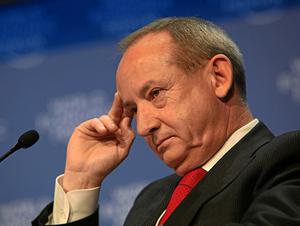Frustrated climate chief calls it quits
Yvo de Boe (Image by Flickr user World Economic Forum (cc: by-nc-sa))
This story is adapted from a broadcast audio segment; use audio player to listen to story in its entirety.
A top United Nations official on climate change calls it quits after four years, raising concerns about the worldwide effort to rein in global warming. Yvo de Boer says he’s resigning as Executive Secretary of the UN Framework Convention on Climate Change, where he fought hard for an international agreement to limit greenhouse gas emissions.
In December, De Boer told “Living on Earth” he was optimistic about the big climate conference in Copenhagen. “What I want to see at the end of this conference is a list of rich country targets that are ambitious; clarity on what major developing countries will do to limit the growth of their emissions; and a list of financial pledges that will make it possible for the much broader developing nation community, both to change the direction of their economic growth and adapt to the inevitable impacts of climate change.”
But Copenhagen brought only limited progress, and De Boer expressed disappointment.
Physicist and climate scientist Bill Hare has watched De Boer’s work for years. He’s a visiting scientist at the Potsdam Institute for climate impact research.
Hare says De Boer was squeezed between big economies like the U.S. and Europe, and developing nations like China and India. “In the last year particularly he’s been under enormous pressure because of the pressures of trying to get, under adverse political circumstances, an ambitious agreement in Copenhagen, and because of the need to sometimes speak plainly about the level of ambition coming forth from major countries, which I’m sure many saw as going somewhat beyond the role of a UN diplomat.”
De Boer seemed at times like a man who was the equivalent of a rope in a tug-of-war with developing nations and developed nations on either end.
“We all know and have heard about pressures upon the executive secretary in the last year from big countries who were reported to be unhappy with his forthright statements,” said Hare. “Publicly, Saudi Arabia criticized Yvo De Boer; we know that China was unhappy with him at different moments; rumors circulated that even the United States was unhappy with him over certain statements and certainly other countries were, as well.”
De Boer’s departure will usher in a period of uncertainty as climate officials look forward to the next major round of talks scheduled for Cancun, Mexico, in ten months. But this isn’t the only hit to climate change efforts. The IPCC – the Intergovernmental Panel on Climate Change – the noble-winning scientific body is under serious attack. Climate change legislation in the US is, at best, stalled.
“I believe the system is in grave danger of collapsing,” said Hare. “I think the IPCC will survive the attacks of the skeptics. And let’s face it, in a report of its size in magnitude, one will always find errors. The remarkable thing is that the Intergovernmental Panel on Climate Change’s report’s have not suffered more attacks.”
Without the leadership of the US, Hare adds, climate efforts won’t go far.
“I think the inability of the United States to bring its domestic legislation to a conclusion is casting a shadow over the whole international regime,” he said. “I fear that unless the United States is able to bring itself to adopt a domestic climate package that has real meaning and action, that it will be very difficult, if not impossible, to bring China and other big developing countries to the table to negotiate a legally binding and ambitious international climate regime.”
Hosted by Steve Curwood, “Living on Earth” is an award-winning environmental news program that delves into the leading issues affecting the world we inhabit. More “Living on Earth.”
